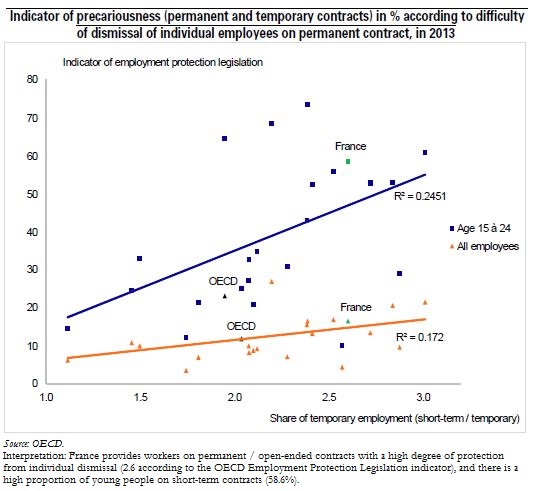Trésor-Economics No. 137 - An economic perspective on dispute resolution in labour law
Seen from an economic perspective, it has been shown that labour market rigidities can adversely impact productivity by reducing companies' capacity to adapt to macroeconomic change. In addition, overly complex and restrictive labour laws can affect employment rates and foster labour market segmentation.
In international comparisons, France is characterised by relatively powerful rigidities in the case of individual dismissals, according to the OECD's Indicator of Employment Protection. This indicator considers legislation governing labour regulations and agreements, but pays very little attention to the actual way in which the law is applied (i.e. jurisprudence), and none at all to how employment tribunals handle disputes. Yet these factors too can affect the cost of dismissals for employee and employer alike.
In France, the conseil des prud'hommes (employment tribunal) is competent to rule on individual employment disputes. Numerous reports have noted the dysfunctional nature of this system as a means of settling disputes. For instance, the employment tribunal reconciliation procedure, which is mandatory, resolved only 5.5% of disputes in 2013. Moreover, the percentage of employment tribunal decisions giving rise to appeals (around 60%) appears very high relative to other jurisdictions. Finally, the tribunal procedures appear to be particularly protracted, lasting more than 15 months on average in 2012, giving rise to repeated condemnations of France under the European Convention for the Protection of Human Rights and Fundamental Freedoms.
The foregoing suggests organisational or procedural adjustments that could improve and accelerate the resolution of employment disputes. In particular, more should be done to improve the effectiveness of the reconciliation phase. One could also consider developing alternative formulas for out-of-court settlement. Beyond that, it might be worth experimenting with a system combining professional and non-professional judges similar to ones existing elsewhere in Europe. These employment tribunals are more or less equivalent to the concept of échevinage.
